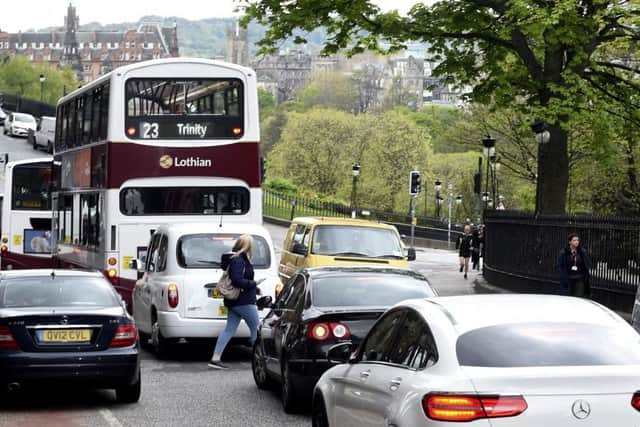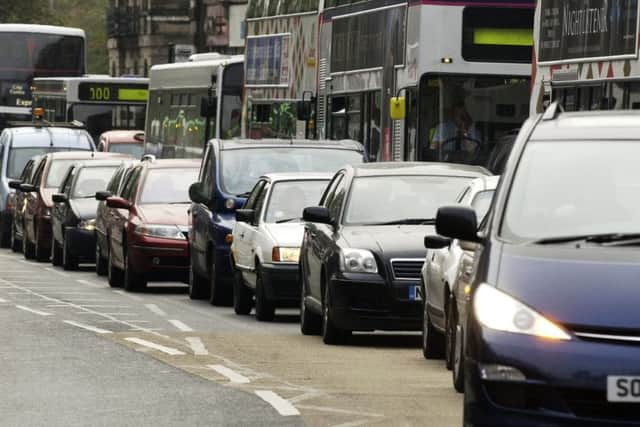Edinburgh cars which fail pollution limits face city ban
and live on Freeview channel 276
Instead of covering just a central area, the Capital’s Low Emission Zone (LEZ) is proposed to extend to the entire city.
And the restrictions would apply to private cars along with buses, lorries and other vehicles.
Advertisement
Hide AdAdvertisement
Hide AdOnly around half the vehicles in the city are expected to meet the required standards.


Transport convener Lesley Macinnes said the move would bring major health benefits. But critics described the proposals as “drastic” and warned they would hit the poorest hardest.
City motorists also raised concerns about the impact of the proposed ban.
The zone is expected to be established by the end of 2020, but it is not clear how the requirements would be phased in.
Advertisement
Hide AdAdvertisement
Hide AdCllr Macinnes promised consultation. But she said: “This is not a whim, but based on evidence. It would result in a better quality of life for the city - a healthier city with less pollution.


“It would deliver a much better city for children to grow up in, older people to grow old in, and for people to visit and commute sustainably in.
“If you have an older car, we will be asking you not to come into the city, or pay an enormous fine.
“We know this is going to demand a lot of change from people, but let’s look at the benefits. The minute you link it to health outcomes and people realise the benefits.”
Advertisement
Hide AdAdvertisement
Hide AdThe zone would permit only diesel vehicles with Euro 6 engines, which were introduced five years ago, and petrol cars with Euro 4 engines, introduced in 2005.
City Tory group leader Iain Whyte said targeting pollution hot spots would be better than a blanket approach.
And he said: “Particularly in relation to diesel cars, if they have to be post-2014 that means an awful lot of people who have paid large sums of money for vehicles - and who thought they were doing the right thing - would be left having to change their car.
“It all seems really quite drastic given the cost it would involve for people.”
Advertisement
Hide AdAdvertisement
Hide AdLiberal Democrat councillor Kevin Lang said Edinburgh faced an air quality crisis with places like Queensferry Road among the worst polluted streets in Scotland.
“We desperately need urgent action to tackle this and an LEZ has a part to play, but it is important that is part of a wider plan that includes significant improvements in public transport. If you are looking to limit private vehicle use, you need to provide viable alternatives.”
But he backed the whole city approach. “If you only have an LEZ in certain streets, the risk is you push the problem to somewhere else.”
Glasgow city centre became Scotland’s first LEZ in January, with 20 per cent of buses required to meet the emission standards, as a first step. The proportion will steadily increase to cover all buses - and other vehicles - by the end of 2022. Aberdeen and Dundee are also due to create zones by the end of next year.
Advertisement
Hide AdAdvertisement
Hide AdGreens supported the idea of a city-wide LEZ. Councillor Gavin Corbett said: “Almost every day new evidence emerges of the need for radical action on the climate emergency and on local air pollution.
“The big questions are not if we should make this happen but how we can make it happen. In particular, how we can help people and businesses make the switch to electric vehicles, to far more cycling and walking and to clean, green public transport.”
Environmental campaigners Friends of the Earth Scotland also welcomed the move.
Air pollution campaigner Gavin Thomson said: “Air pollution is responsible for over 2500 early deaths every year in Scotland and has been linked with heart attacks, strokes, and cancers. Vulnerable groups such as the young, the elderly and those already suffering ill health are at particular risk.
Advertisement
Hide AdAdvertisement
Hide Ad“If LEZs are too small, traffic will just be redirected to drive round it. Toxic air pollution will just be moved from city centres to residential streets.”
But Neil Greig of motoring group IAM RoadSmart said a city-wide LEZ seemed “a little draconian”.
He said: “It will inevitably cover areas that do not have an air quality problem. The council should bring forward clear evidence that every location in the whole city is suffering before they put forward sanctions and control.
“Restrictions on older cars will hit the poorest residents who often live in the peripheral estates.”